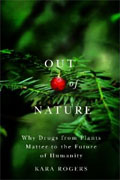Out of Nature
Kara Rogers
book reviews:
· general fiction
· chick lit/romance
· sci-fi/fantasy
· graphic novels
· nonfiction
· audio books
· author interviews
· children's books @
curledupkids.com
· DVD reviews @
curledupdvd.com
newsletter
win books
buy online
links
home
for authors
& publishers
for reviewers

 |
Out of Nature: Why Drugs from Plants Matter to the Future of Humanity Kara Rogers University of Arizona Press Paperback 216 pages February 2012 |
|
Like many of you, I am an enemy of Big Pharma. I make it a point to stay mad and stay defensive about what I eat and what medicines
(if any) I take. In fact, while reading Out of Nature
So what’s the big deal with Big Pharma and the little people of the world? What’s the deal with big government programs and little growers and economically challenged consumers? Where do our foods and medicines come from--and, better question, where the heck are they going? If you think you need to know more about the slow attrition of plants and why it might matter, why “wild” matters in your life and future, you should read Out of Nature Rogers characterizes the ecological conflict that we are all groaning with as “cancer versus owl.” The example is a medicinal substance known as Taxol. Taxol was being extracted from the bark of ancient yew trees in the Pacific Northwest; then the yew forests were found to be the last habitat of the endangered spotted owl. So people, maybe good people, had to choose between curing their cancer or their father’s cancer or their neighbor’s cancer, or saving a “last of” species. Luckily, chemistry saved the day for the owl and the cancer victim, as scientists were able to create the yew bark compound synthetically. But without the bark as the template, without the herbal substance--whether it is artemisia, ginseng or ginger--and equally as crucial, without the tradition of using these substances for healing, how would we know where to start? When I contemplate this issue, the disappearance of plant life and what it means, I picture a big muddy boot stomping through the undergrowth, tearing and destroying everything beneath its weight. But the truth is worse, symbolically, with monster earth-moving machines doing the damage and no one ever looking down to see what was there before it’s gone. Just. Gone. And with it, not only food but medicines will be lost. As Rogers explains, “The loss of biodiversity, including the loss of plants and the insects that pollinate and coexist with them, represents a loss of potential medicines…much of the current natural-products discovery centers on the identification of species that have been used in traditional medicine for centuries.” But there is a ray of hope, in the form of a new kind of, shall we say, “small pharma”--again, quoting Rogers: "The manufacture and marketing of an "all-natural" substance that is spiked with synthetic drugs but sold based on applications learned from systems of traditional medicine misrepresents indigenous knowledge and obscures scientific efforts to better understand natural products. The appreciation for the natural world that is found within indigenous communities has become a subject of careful research in ethnobotany and ethnopharmacology." [emphasis mine]Ethnobotany and ethnopharmacology take culture into account, seeing the plant in its place--not only in the bio-environment but in the athro-environment: How have people traditionally used these plants? What results have they demonstrated? Rogers speaks of “biophilia”--our innate attraction to the natural world--and notes that it has been “weakened as we become more technologically oriented.” So there is a struggle within each of us, along with the struggle of all of us together, to keep what we can of Mother Nature’s gifts and make sure that we don’t step on our own treasures. Rogers urges us to re-engage to the greatest extent possible with the living world and disconnect as much as we can from technology. She characterizes this as “stepping into the world around us,” a charming, almost cinematic image. Let us hope it is not too late for this adventure. Originally published on Curled Up With A Good Book at www.curledup.com. © Barbara Bamberger Scott, 2012 |
|
|
|
 Click here to learn more about this month's sponsor! |
|
| fiction · sf/f · comic books · nonfiction · audio newsletter · free book contest · buy books online review index · links · · authors & publishers reviewers |
|
| site by ELBO Computing Resources, Inc. | |
 Reading up on home gardening, canning, and varieties of the veggies and fruits we love, I have become increasingly dismayed at the apparent ignorance of the most vertical occupants of our planetary space (us, humans): do we realize we’re losing foods and medicines (plant life) at a rate of--by some estimates--27,000 per year? Even a conservative (environmental skeptic) estimate of species loss shows that we’ve stepped up the rate radically in the past 100 years. Yes, it’s about the rainforests, but it’s about the industrialized nations, too, where we have become experts at cultivating the precise kind of corn we “need” for oil and syrup, while trampling and poisoning the little blades of grass that used to grow in between the rows.
Reading up on home gardening, canning, and varieties of the veggies and fruits we love, I have become increasingly dismayed at the apparent ignorance of the most vertical occupants of our planetary space (us, humans): do we realize we’re losing foods and medicines (plant life) at a rate of--by some estimates--27,000 per year? Even a conservative (environmental skeptic) estimate of species loss shows that we’ve stepped up the rate radically in the past 100 years. Yes, it’s about the rainforests, but it’s about the industrialized nations, too, where we have become experts at cultivating the precise kind of corn we “need” for oil and syrup, while trampling and poisoning the little blades of grass that used to grow in between the rows.